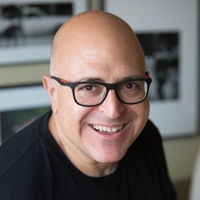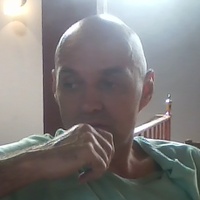On prioritizing kindness
Prelude
Born in Japan and raised in three continents, Mayumi Yoshida is a director, actor, writer and producer based in Vancouver, BC. She’s an alumna of Women In the Director’s Chair, WBD Access x Canadian Academy Writers Program (2021) and Directors Program (2023), TIFF Writer’s Studio, and TIFF Netflix Talent Accelerator Fellowship. Her directorial debut short film, Akashi, which she wrote and acted in, won Outstanding Writer out of 4500 films at NBCUniversal Short Film Festival, Best Female Director at Vancouver Short Film Festival and many more awards internationally. The latest music video she directed, Different Than Before by Amanda Sum, starring Tzi Ma (Mulan), earned a Vimeo Staff Pick, Jury Award at SXSW Music Video Competition, and screened at Oscar- and BAFTA-qualifying film festivals. Her first feature, Akashi, which was shot in Japan and Canada, is set to premiere in 2025.
Conversation
On prioritizing kindness
Writer, director, and actor Mayumi Yoshida discusses returning to first drafts, giving love to her collaborators, and the distraction-free hours that got her through her busiest periods.
As told to Kailey and Sam Spear, 1775 words.
Tags: Film, Collaboration, Process, Family, Mentorship.
You just made your first feature film, Akashi. Congratulations! Not only did you direct it, you also wrote the screenplay and acted in it. Was there a certain moment or experience that made you feel ready to direct your first feature or was it a gradual build to feeling it was the right time?
The feature development was actually a very long time. The short [Akashi] came out in 2017, and we shot in 2016, but it was also a play in 2016. So, the story was there for a while. Then with the 2017 festival run, we gained this momentum, which then led me to representation in LA and with [talent agency] Gersh. I think when they came on board, the idea was planted in me that this should be a feature. Then we started writing—“we” as in “me.” I would work with my manager and go back and forth a lot because this was my first time writing a feature. I think 2018 is when I had my very, very first draft, pretty much a vomit draft of the feature. For years I was just polishing and polishing and polishing.
I didn’t go to film school… So while I was hoping to get this feature off the ground, I also was like, “I got to clock the hours!” I made shorts and music videos to continue learning and honing my skills as a writer and director. Between that, I had acting auditions and getting gigs as an actor or as a dialect coach. There were a lot of detours that I made because of gigs. One of the other things I did was cultural consulting, which led to becoming an associate producer for the A24 show Sunny. The detours all eventually became prep for my feature. I did it because that was the opportunity that came in front of me, but I made sure these experiences were meaningful for what I really wanted to do, which was making Akashi. There wasn’t any big, “I’m going to leap into this.” I was more like, “When will it happen?” Waiting to start at any moment was my status for a long time. So it felt like, “Okay, finally, we’re here,” when we were about to shoot.
Were there any fears you had making this film? How did you navigate those obstacles?
I was afraid people would oppose me taking on the roles of actor, writer, and director. Early on, that fear lingered, but surprisingly, everyone else was convinced it had to be me—far more than I believed it myself. It was such a wonderful and unexpected validation. I kept doubting myself. I didn’t think I should do it at first, because it’s my first feature and it’s the lead. It was just such a huge undertaking. For marketability, you would want the “number one” [lead actor] to be someone… It doesn’t have to be, at all, but if you’re thinking of strategy for film festivals and overall marketability for the film, it is harder if you don’t have a “name” attached. So, that was a considering factor for me, as a director. I was a bit worried about that, but weirdly, nobody else was. Or maybe they were really nice. [*laughs*] But they all made me feel like it had to be me. It was a support system that I got from my producers, DP, cast—everybody, everybody.
Working on a long-term project like this and balancing many roles, how did you maintain your energy and focus without burning out?
I was lucky because the year before, I did the show Sunny. We were shooting 100 days. We had 10 episodes to shoot from July till the end of December. To this day, I think that was the most challenging thing I’ve ever done. Not only are we doing that many days and long hours, but also producing was not something that I knew how to do comfortably. I had to dive right into it, which was a great experience and totally prepped me to learn what that routine is like, and how I can reset myself to come back on Monday after. Because obviously, over the weekends, you’re still kind of working.
I had this thing where I would go to a head spa for one hour. That one hour was the reset time, so that I could be away from any notification, phone, anything, and someone is just touching my scalp with no interruption, just my thoughts. That brought me sanity, I think. I realized that you have to check in with yourself. What are you doing this for? Who you are? All of these very bare bone essential questions that you seem to forget when you get so busy.

You’ve talked about the importance of collaborators. What do you look for in the people you bring on board a project like this?
I love people who know how to be good to others. You can’t do this alone, and you can’t always put yourself first. Of course, you have to prioritize your work because you’re responsible for it. But at the end of the day, it’s always a collaboration. Personality matters so much, in my opinion. When I say, “good vibes only,” I’m not joking. It’s so important. Just one bad vibe can throw everything off.
Something that I love, that I think Akira Kurosawa said: “I like to work with people who have been loved by their parents because they’re not afraid of giving away love and kindness.” They don’t think that something is taken away from them in the giving. They won’t think that way because they have had that abundance of love inside them… A mentor of mine a long time ago said, “I love that you’re loved by your parents. I can tell you’ve been brought up in a family where you were loved.” I’m like, “What does that mean? What does that have to do with my career?” But he kept saying, “You’re going to do well just because you were loved by your parents.” I think now I understand. I agree with the fact that I’m not afraid to give love, or give away whatever I have, because it’s not precious to me. The more the merrier, in terms of good vibes.
You talked about that first “vomit draft”, as you called it, and how you worked at polishing and polishing. Looking back at that draft, and the polish, what difference do you see?
I think I actually did [look back] when I was editing because sometimes when you’re feeling like you’re a bit stuck in an edit, it helps to go way, way back to see what the origin of this scene. In a good way, the very, very first draft just tells it as it is. Which is often not good writing, but very informative. Like, “Oh, right, this is what I was clearly trying to say.” It was almost like a note about what the seed of the scene was.
What definitely improved was, “How do you leave a scene earlier?” I remember reading the earlier draft thinking, “How do I get out of this scene?”—which means that you should have gotten out of it a page before. I felt like I was lingering, or looping what I’m trying to say, many times.
What advice do you have for creatives who may feel stuck in one phase of their career and are unsure of how to take that next big step?
If you feel stuck, then purposely put yourself in a different place. Just fully shift 180, and it doesn’t even have to be in the same field… It’s about taking a leap and trusting the process.
I felt like doing music videos wasn’t a thing that I had imagined, but because of Amanda [Sum]—I knew her from theater—we did a super, super, super low budget one in 2020. When we decided to do another one [Different Than Before], that just took off and went to big festivals, and then we won SXSW. I truly did not expect that outcome because it really was a labor of love with everybody. We strategized so that the video would have an impact in our community, but never thought of how it would do well in festivals because that wasn’t the goal, really. It was just to spread the message of Stop Asian Hate. So we were all feeling pleasantly surprised that we kept getting so much response from everywhere. Again, [directing music videos] was not really my field, and it was, to me, a 180 in terms of doing something but still keeping my essence as a director and keeping my vision.
You talked about how films rarely go to perfect plan. What’s your advice for dealing with imperfections in your creative work?
I purposefully don’t make it perfect. I will leave enough space so that there’s a wiggle room for exploration always, because I don’t consider myself perfect and I also don’t think there’s such a thing. I think joy comes from exploring [a creative work] with other people and finding it in the unknown space. Also, setting the foundation really strong so that it’s bulletproof is important. If we know that the foundation is solid, we will be able to dance freely on top of that. I feel like that’s the joy in creation. Freedom within form is where you want to be.
Mayumi Yoshida recommends:
Airports. They might be my favorite place to hang out. The sound, the energy, everything has a distinct feel.
Hats. I have different eras of hats. It’s an obsession. But when it fits, you can’t walk away from it.
Platform shoes. I think it’s now my other signature item, other than my hats. It feels so right when you find your style.
Pop music. The first CD I bought was Spice Girls, first boy band I loved was Backstreet Boys; I had a phase of MJ, Beatles and Queen, and obviously J-POP. Now I’m into BTS and Seventeen. Beyoncé, Adele, Celine, Namie Amuro, Hikaru Utada, all the divas. I’m a pop lover; it’s a good life over here.
Film and TV. It’s now my job, but I still love watching, rewatching, discovering, and obviously making them. Love the classics especially. Chaplin, Kurosawa, Ozu and many more. I can’t even start a list of ones I love, just go to my Letterboxd lol.
- Name
- Mayumi Yoshida
- Vocation
- writer, director, actor, producer
Some Things
Pagination



